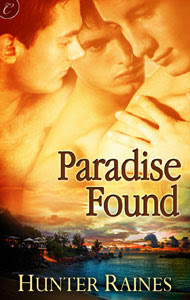Writing a ménage romance like PARADISE FOUND comes with its own set of challenges. Not only do authors have to keep track of all the body parts in love scenes and make sure positions still make sense (you’d be surprised how often we end up with three-armed heroes or feet where feet don’t belong), but we also have to ensure our characters are well-developed, fully fleshed out human beings. All three of them.
Researching a character’s profession is one of my favorite tasks. Although I write full time now, when I had a day job I figured my profession was pretty darn boring. I’ve worked in the marketing department of large I.T. organizations, I’ve written multi-million dollar proposals for a construction project management company, and I’ve been the communications manager of a small non-profit organization. All interesting jobs in their own way, but nothing like some of the exciting occupations my characters get to experience.
When I was in high school, I was convinced I’d end up being a lawyer. So much so that even my boyfriend (now husband) started calling me ‘Counselor,’ despite the fact that I was 18 at the time and nowhere close to becoming an attorney. Well, life didn’t quite turn out the way I’d expected, and I never did become a lawyer. But that doesn’t mean I can’t live vicariously through my characters.
Philip is an attorney working for his family’s law firm in Boston. Because his job is such an important part of his identity, I needed to make sure I understood what goes on in the mind of a lawyer. To do that, I found two books invaluable: Think Like a Lawyer: The Art of Argument for Law Students, by Gary Fidel and Linda Cantoni; and The Happy Lawyer : Making a Good Life in the Law by Nancy Levit and Douglas O. Linder. Those two books provided an excellent starting point. After that, I interviewed our family lawyer (keeping tight-lipped about the kind of book I was writing), and I scoured websites of Boston legal firms to get an understanding of location, layout, and services offered.
Cameron’s job was a little easier to explore, and more fun as well. He’s a highly sought after fashion photographer. This is where I get a little personal and admit I’m a huge fan of America’s Next Top Model. On that show, they set up elaborate fashion shoots, with fabulous clothes, make-up, and setting details. I’ve always been enthralled by the entire phenomenon, so in PARADISE FOUND, Cameron gets to participate in one of those shoots. I also interviewed a portrait photographer as part of my research. (Alas, I couldn’t find a celebrity fashion photographer who’d talk to me.)
Last but not least, there was Mark. He works as a sketch artist for the Los Angeles Police Department. I scoured the internet for information on sketch artists. What do they do? How do they do it? How do they spend a typical day? I wrote a scene that showed Mark at work in an early draft of the book, but it didn’t make the final cut. So although we don’t get to see Mark going about his job like Philip and Cameron do in PARADISE FOUND, he mentions his work on occasion, and an important plot development occurs because of who he is, and what he does.
I’d love to hear from you! How important is a character’s job in your reading material? Do you like it when authors go in depth and take you behind-the-scenes of a particular profession, or do you prefer that those details be glossed over? What’s the most intriguing or memorable profession you’ve come across in your reading?
Leave me a comment to be entered in the draw for a $10 Amazon gift certificate. I’ll choose one random winner daily, so if you comment every day I’m here, you’ll get three chances to win!
---
EXCERPT
“No, no, no. Your hair’s in your face. Move your arm down an inch. You’re slouching!” Cameron set his camera down and stormed over to the edge of the pool, where a swimsuit model gawked at him with wide, terrified eyes.
“I—I’m so sorry, Cam. I—I’ll try to do better.”
He growled low under his breath, grabbed her arm and positioned it where he wanted it. “Stay.”
The woman’s arm quivered, but her professional demeanor took over the moment he snatched up the camera again. All hint of fear disappeared, and her flawless face took on a sultry edge as she stared at him. He kept the shutter button pressed and took photo after photo at burst speed, hoping at least one of them would capture the sexy allure his client wanted. The model moved with him, trying different poses—this one standing, that one lying down—but his irritation only grew more pronounced as shots that should have been intense and captivating turned out dull and insipid.
“Stop. Just stop.” He all but tossed the camera at the art director, who glared at him over the top of the monitor where the photos popped up as soon as he took them.
The model came running after him, hobbling on her five-inch heels. “Did I do something—”
“I need fifteen minutes.” He practically barked at her over his shoulder, and although he didn’t bother to look behind him, he heard her stumble to an abrupt halt.
He scrubbed a hand over his face and marched away from set. Not that he could go far. They were shooting the cover of a men’s magazine today, and the set was an elegant celebrity mansion his client was renting by the hour. Every moment Cameron wasted cost the magazine a small fortune, and the art director wasn’t likely to let him forget it.
“Damn.” He ambled over to the far edge of the neatly trimmed lawn and leaned against the wrought- iron fence. He was messing up the shoot. The model was fine—better than fine, really. The client had good taste. They’d chosen a tiny nymphet with slanted green eyes and shiny red hair. Her bikini was the barely there sort, with three tiny triangles expertly positioned over her naughty bits. In person, she’d make any red- blooded male go hard in less than the time it took Cameron to get off a shot. In pictures, she looked like a cardboard cutout, lifeless and flat.
It was his fault. He couldn’t focus. All morning he’d been wondering what had possessed him to go to The Silver Whip. Seeing Emerald again had stirred layers upon layers of doubt and guilt, and as much as he hated to admit it, longing, too. And that longing brought with it memories of Philip, which got him hard in two seconds flat, making it damn near impossible to concentrate on taking perfect pictures of gorgeous women.
PARADISE FOUND is available at Carina Press, Amazon, and other online retailers.
---
Find Hunter on…
Facebook:http://www.facebook.com/profile.php?id=100002027648828
Twitter: http://twitter.com/#!/hrainesauthor
Yahoo: http://groups.yahoo.com/group/TotalExposure/
Tuesday, June 7, 2011
Subscribe to:
Post Comments (Atom)




7 comments:
I think a character's job can be pretty important in the story since often the skills they have because of that job come into play at some point. I don't like for the details to get glossed over but at the same time I don't think I need to know everything about the job...I like a happy middle ground.
throuthehaze at gmail dot com
One if the aspects of a novel that makes it good reading for me is the fact that the author has done good research about a number of things: the context, be it historical or geographical--even if a locality is fictional it still has to be believable--as well as those professions of the characters. Those of us who love to read and read lots of books may, like you, not be attorneys or such, but we have knocked around life enough that an author's lack of information about a particular profession becomes obvious if good research isn't done. Thanks for sharing and giving us your perspective. I have seen this book on some of the promotionals from publishers and it really looks very good.
throuthehaze - That happy middle ground is the way to go with everything, I think. Whether it's description, or a character's inner monologue, or even emotion... A sprinkling of focused details goes a long way. Thanks for chiming in!
Dr. J - I couldn't agree more: research is key. Nothing takes me out of a book quicker than stopping to question a detail, or two, or a dozen things that just don't make sense. On the other hand, I get positively giddy when it's clear the author knows what he or she is talking about.
I agree that a character's job can be very important to a story and if the character's personality doesn't match the job it can really detract from the story. Say you have an introverted character, he most likely wouldn't be believable as a motivation speaker. It also is a problem if the author gets a key element of the job wrong (like having tax season for a CPA in November instead of ending in April). I'm looking forward to reading "Paradise Found" soon.
Jobs can definitely make the story interesting. It's cool when one of the characters is a writer :-)
Jobs are such a large part of our lives that I love it when the author shows a character actually working. It adds more flavor to the book IMHO. plus I think that every job has some interesting elements to it. I've learned all sorts of random factoids from books so I love it when the author actually describes a particular job or shows the character in action
Jen at delux dot com
i like reading about the different jobs to me it makes the story more interesting
meandi09@yahoo.com
Post a Comment